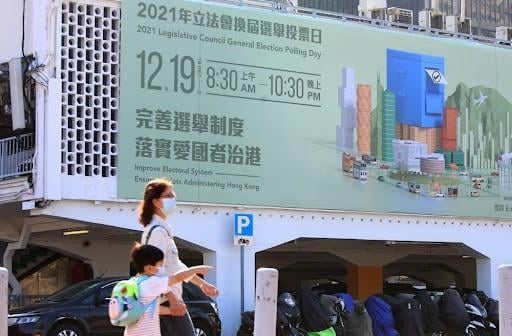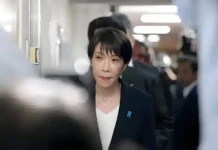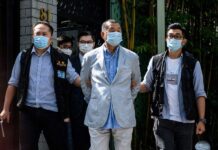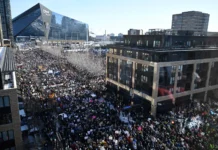“Government credibility is high, but voter turnout will be low” – says Carrie Lam
Zuo Ren, Socialist Action
The first Legislative Council (Legco) elections since Beijing’s “makeover” will be held on December 19. The Chinese dictatorship (CCP) has increased the size of the Legco to 90 seats, only 22 of which are elected. In addition, candidates must first be approved by the national security organs to ensure the dictum of “patriots ruling Hong Kong”. Consequently, the election atmosphere is unprecedentedly subdued and it is likely that voter turnout will be the lowest in history.
The Hong Kong Public Opinion Research Institute announced in December that 36 percent of respondents don’t intend to vote. This number does not include respondents who are afraid to answer honestly for fear of breaching the National Security Law. In past Legco election surveys since 2004, respondents’ intention to vote has always been higher than 80 percent.
Long before this restructuring, Hong Kong’s Legco was already a lame parliament – the opposition could pose no real threat to the CCP within it. Not only that but in the past the pan-democrats obsessed over gradual reforms within the parliamentary system, turning the Legco into a safety valve to ease the pressure of mass discontent. Now, under Xi Jinping’s high-handed dictates, all space for parliamentary manoeuvres and theatrics has been removed. Rather than strengthen Xi, the CCP, and Hong Kong’s ruling group, these hardline policies only undermine its long-term viability.
As if intoxicated by their own propaganda, Hong Kong’s rulers continue to deceive themselves and others at the same time. In an interview with the Global Times, a nationalistic CCP newspaper, Chief Executive Carrie Lam stated “the government’s credibility is high, but the voter turnout will be low”.
At the same time, the government fears that low turnout will undermine its authority, so it has done its utmost to increase turnout. First, it has made it a crime for anyone to “incite” others to cast “spoiled” votes. Then it threatened the polling firms that they may be in violation of the law simply for asking people their intentions around the election.
In addition, the government set up polling stations on the other side of the border to mobilize the votes of pro-CCP Hong Kong people living in the mainland. However, no matter how powerful a repressive machine is, it cannot force voters who are “lying flat” to stand up (“lying flat” is the latest mass trend among mainland youth who refuse to participate in the capitalist rat-race).
Pan-democratic betrayals
Some so-called moderate pan-democratic politicians continue to betray the struggle for democracy. For example, Frederick Fung Kin-kee, former chairman of the ADPL (Association for Democracy and People’s Livelihood) and Nelson Wong Sing-chi, formerly a leader of the Democratic Party, have acted as extras in the election farce.
The moderate pan-democrats fell into a serious disagreement over whether to participate in the election or not. Although they gave up their plans to run due to mass pressure, their secret betrayals continued. The Democratic Party’s vice-chairman Edith Leung, was revealed to be supporting Jason Poon, the managing director of China Technology, who was nominated by Anthony Wu, a member of the Standing Committee of the Chinese People’s Political Consultative Conference (a CCP-led mainland body) to run as a candidate in the Hong Kong Island East district.
Since the National Security Law was passed in July 2020, the CCP’s brutal suppression has not skipped a beat. In the name of epidemic prevention measures, Carrie Lam continues to strengthen the state’s surveillance on citizens, introduced mandatory use of the ‘Leave Home Safe’ app, and continued the ban on gatherings of more than four people, even threatening to prosecute anyone who “instigates” others not to get vaccinated. In addition, freedom of the press has been destroyed. The resignation of the editor-in-chief of Stand News newspaper, and the refusal to renew the work visa for Economist reporter Sue-Lin Wong are among several recent cases.
No matter how strong the repression is, the social crises cannot be concealed, and so public grievances will not end. There were 1.6 million poor people in Hong Kong last year, a poverty rate as high as 23.6 percent. This is a record high since 2009. One in four Hong Kong residents are classified as poor, and nearly 30 percent of them come from working households. What a great irony of Xi Jinping’s so-called Comprehensive Poverty Alleviation and Common Prosperity policies. Xi already declared victory in eradicating poverty throughout China last year!
School brainwashing
Secretary of Education Kevin Yeung Yun-hung recently criticized the current lying-flat doctrine, declaring that “industriousness and struggle” should be added to the cultivation of values, while “respect for human rights” and “critical thinking” have been deleted from the government’s Guide to Moral and Civic Education Curriculum for Hong Kong schools. In other words, “critical thinking” is out!
In mainland China, the idea of ‘lying flat’ has emerged as young people reject high-pressure social norms, give up on buying a house, oppose marriage and having children, living a minimalist life at the lowest possible cost. The CCP treats this social phenomenon as a major enemy, seeing it as the root cause of disruption of the economic order and the country’s population crisis. It launched a state media campaign to condemn the lying-flat trend, a mere feature of cyber-culture, and vigorously promoted the idea of “struggle” against it in the recent Sixth Plenum of the Central Committee.
The Hong Kong Education Bureau is only copying Xi’s attempts to rule the youth through a repressive paternalist system. But the more the ruler clamours, the more deaf are the youth to his commands.
Hong Kong young people, like mainland youth, faced with high housing prices and hopeless prospects, know that the fruits of their hard work and progress will only be taken away by the ruling class. The anti-authoritarian movement in Hong Kong in 2019 was the first awakening of the youth’s resistance to the system, a case of real “struggle” for them. After the movement was suppressed by the police and failed, a sense of temporary despair and powerlessness permeated the youth.
The dictatorship’s strengthening of its ideological suppression of the education system will only disgust more teachers, students and parents, many of whom will choose to leave Hong Kong to escape this crude brainwashing approach. In the 2020-2021 academic year, the number of Hong Kong students withdrawing from school increased 1.7 times, equivalent to an average of 32 students withdrawing from each school. Of these, 60 percent left Hong Kong. Approximately 7.1 teachers per school quit their jobs, nearly double the number of a year ago.
United struggle
Xi Jinping is preparing to be ‘re-elected’ as president at the CCP congress next year. To survive he must strengthen and consolidate his power. As a result of the high-tension Sino-US conflict, Xi needs to suppress Hong Kong as a demonstration of power. Therefore, the fate of Hong Kong does not depend solely on forces within the city, but on the whole of China and even the international situation.
Against the background of a deep crisis of the global capitalist system, both Xi’s and Biden’s rule are wracked by serious crises at home and internationally. The voices of discontent among the masses have become stronger and stronger, the radicalization of young people and increasing class consciousness provide a glimmer of light to the dark situation in Hong Kong. When the masses of mainland China stand up, the masses of Hong Kong and internationally will also stand higher. Workers need to unite and fight together to challenge totalitarianism and capitalism of all stripes.




